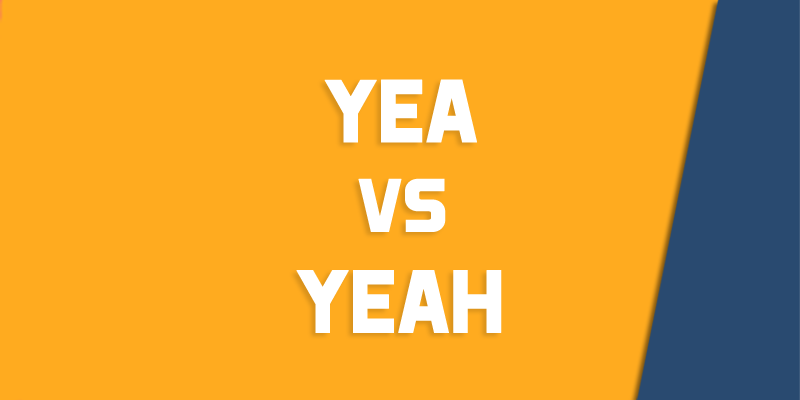Yea vs. Yeah – What’s the Gist?
On its face, yea and yeah seem to reflect the same idea: one of affirmation. Although they look similar, these two words are pronounced differently and have slightly different meanings.
- Yea is either an adverb or a noun.
- Yeah is an adverb.
Let’s explore the differences.

How to Use Yea in a Sentence
Yea definition: As an adverb, yea (pronounced yay) means: during formal voting to indicate yes; or more than this; or informally, to this extent or degree.
For example:
- The representative from congress answered, “Yea” when asked if the bill should pass. (Adverb)
- To emphasize the point about no late homework, the teacher said, “Homework will be turned in on time; yea, not even one day will pass, that I will allow it to be turned in.” (Adverb)
- When the little boy was asked how large the fish was that he caught, he demonstrated, “About yea big.” (Adverb)
When yea functions as a noun, it means affirmation or assent.
For example:
- After the Senate voted on the bill, the roll call revealed 96 yeas and 0 nays. (Noun)
By the way, although yea is pronounced just like the word yay, the latter is used more to express enthusiasm rather than agreement.
How to Use Yeah in a Sentence
Yeah definition: The definition for the adverb yeah (pronounced \yeə\) is a simple one; it means yes.
For example:
- When her roommate asked if she was ready for supper, the woman responded, “Yeah.” (Adverb)
- After the grammar professor said that there was no such thing as a double positive, a smart student replied, “Yeah, right.” (Adverb)
Keep in mind that the word yeah is an informal expression, and one best used for casual communication.
Outside Examples of Yea vs. Yeah
- An adaptation of a series of overtly Christian apocalyptic novels which were previously adapted into a film trilogy, this was probably always a tough sell, but critics didn’t hold back, forming the consensus: “Yea verily, like unto a plague of locusts, Left Behind hath begat a further scourge of devastation upon Nicolas Cage’s once-proud filmography.” –Looper
- Were people voting both yea and nay during voice votes, knowing they were off-screen and wouldn’t get caught? –Politico
- A friend described it as suddenly becoming an administrative assistant to the busiest, and tiniest, CEOs. We schedule their calls, make sure their work stays on track, get them to stop for lunch and even make that lunch. And, oh yeah, my husband and I have jobs, too. –New York Post
- “Both of them without me even trying to sway them one way or another, both of them were like, ‘Yeah, that was by far the best football experience from a fan and a community perspective.’” –The Plain Dealer
Phrases That Use Yea and Yeah
There are some idioms that use the word yea or yeah, including:
Yea, verily: An outdated phrase found in some versions of the Christian Bible that emphasizes the point that follows or reveals affirmation.
- Paul writes, “Yea verily, and I count all things to be loss for the excellency of the knowledge of Christ Jesus my Lord” (Philippians 3.8).
Yea or nay: Typically, a question asked by someone wanting a yes or no answer.
- The mother asked her family, “Do you want tacos for dinner? Yea or nay?”
Oh yeah: This idiom can be either a statement meaning a yes, or a question expressing doubt or surprise, questioning the validity of a statement.
- When the woman said to her friend that she wanted to start running every day, her friend said doubtfully, “Oh yeah?”
Yeah, baby: A phrase used when someone gives an enthusiastic response or is happy about something.
- When the boy suggested going out for ice cream, his friend said, “Yeah, baby!”
How to Remember These Words
The best way to distinguish between these two words is to keep the pronunciations of each one in mind. When you are formally voting on something or informally expressing the size of something, yea is pronounced \yay\.
But when you want to express your agreement with something informally, yeah is pronounced \yeə\.
For example:
- The councilmember voted, “Yea,” for the change in the statute. (Adverb)
- The grandmother said, “She’s about yea tall.” (Adverb)
- Yeah! Let’s go to the park. (Adverb)
Quiz: Yea or Yeah
- The little girl indicated with her hands that the toy was _______ long.
- He replied informally, “_______,” when asked a question.
- The student council member voted _______ to add selling snacks during lunch.
- The little boy grumbled to his dad, “_______, I’m coming.”
Article Summary
Is yea or yeah correct? Ask yourself if you want to be formal or informal. If you are looking for formality, pick yea. If you are looking to communicate informally, chances are you should be choosing the word yeah.
- Yea is either an adverb or noun.
- Yeah is an adverb.
Quiz Answers
- Yea
- Yeah
- Yea
- Yeah
